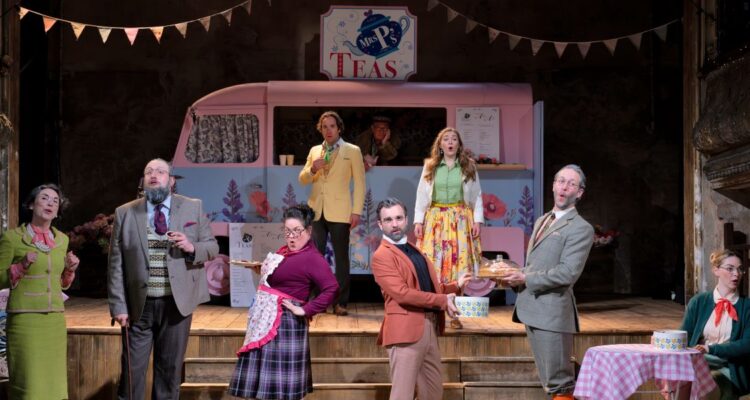‘The Sorcerer’ is the third of the G&S collaborations, though now not well known. However, as it immediately precedes their breakthrough with ‘HMS Pinafore, it represents a important stage in the development of the conventions of the Savoy operas. Although running to only two acts, it is the first of their works in which most of the pieces of the jigsaw are first securely assembled – the framing trope of topsy-turvy, the showpiece soprano aria, the patter song, the soulful romantic lament for the tenor, droll character roles, and jaunty, witty choruses of mild social satire. It is also heavily engaged in parody of contemporary opera, with its send up of elixirs and love potions coming only a decade after the first performance of ‘Tristan and Isolde.’ But the fundamental reason for reviving it is tha,t in the right hands, it is still a lot of innocent fun.
For all these reasons then, it is very welcome so see John Savournin take up its cause once more and bring one of his characteristically deft and subtly updated Charles Court Opera productions to Wiltons, itself an ideal kind of venue for this repertory.
We find ourselves in an archetypal English village where Alexis and Aline, scions of the local aristocracy, are about to be betrothed. But Alexis suffers from a developed social conscience, and comes up with the idea of a love elixir to be delivered from a shared pot of tea which fill induce all the single people in the community to fall in love with no respect to class or rank. A local sorcerer, John Wellington Wells, is recruited to set this in motion and the villagers are duly stupefied by the time we break for the interval. The second half allows us to enjoy the unravelling of all the resulting complications and convolutions.
But the plot is really the least of it.
What matters here are the opportunities for a fine set of singer-actors to bring to comic life a rich cast of recognisably English types and characters. They are framed within an England that could be anywhere between the 1940s and 1980s, the period when we might have seen a van like the one dominating the stage selling tea and cakes. We have a couple of eccentric aristocrats who were too complcatedly polite to marry when they could; a confirmed bachelor clergyman full of vague whimsy; the tea lady and her daughter – the latter harbouring a secret passion for the clergyman; a deaf notary; the apparently loving couple at the centre of the action, and the ‘sorcerer’ as a bumbling master of ceremonies. On one level this is all fully nonsense; but it is played with such conviction, comic brio, and sense of belief in the style that it carries all before it.
The cast are uniformly excellent, each taking their moments under the spotlight with panache, but blending equally well as a team. In a short review it is hard to do justice to everyone, but Matthew Palmer and Catrine Kirkman were particularly delightful as the couple of elderly bluebloods; Ellie Neate was precise, pert and energetic as the heroine in G&S needs to be; while Matthew Kellett was the embodiment of comic Anglican unworldliness, as Hugo Herman-Wilson was of legalistic deafness. Rosie Strobel and Meriel Cunningham trod the line delicately between character and caricature, and Richard Suart, a D’Oyly Carte specialist, cast the spells well as the ‘sorcerer’. Only Robin Bailey, as Alexis, rather overdid his performance, too much of which was delivered much too loudly for the ambience of the venue.
Crucial to the success of the production was David Eaton’s performance as musical director, finding a way somehow of both coordinating with clear leads all the complex musical lines, while still remaining fully in command of a varied palette of keyboard colour. He deservedly received a huge cheer at the end. Lucy Fowler’s gaudy, cheerful staging and costumes set just the right jaunty retro tone, representing an important contribution to the overall success of the evening.
You won’t see a better production of this charming work: whether in London, or on tour, it will surely still amuse and delight.
W.S. Gilbert and Arthur Sullivan
Charles Court Opera
Director: John Savournin
Cast: Robin Bailey, Meriel Cunningham, Hugo Herman-Wilson, Matthew Kellett, Catrine Kirkman, Ellie Neate, Matthew Palmer, Rosie Strobel, John Wellington Wells
Photo Credit: Bill Knight
Until 15 June 2024
2 hours with interval

